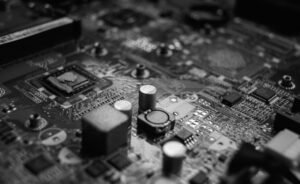AI in Movie Production
Artificial Intelligence (AI) has been making significant strides across various industries, and the movie production industry is no exception. As technology continues to evolve, filmmakers are now utilizing AI techniques to streamline various aspects of the movie-making process, from scriptwriting to visual effects. By leveraging AI, movie production companies can improve efficiency, enhance creativity, and deliver captivating films to audiences worldwide.
Key Takeaways
- AI in movie production streamlines the filmmaking process.
- AI enhances visual effects and animation creation.
- AI-powered systems assist in script analysis and decision-making.
The Benefits of AI in Movie Production
AI offers numerous benefits to the movie production industry. One of the main advantages is its ability to streamline the filmmaking process. AI-powered systems can analyze vast amounts of data, helping filmmakers make more informed decisions about casting choices, marketing strategies, and distribution plans. By automating certain tasks, AI frees up time for filmmakers to focus on creative aspects.
With AI, movie production becomes more efficient and data-driven.
Enhancing Visual Effects and Animation
Another area where AI shines in movie production is in the realm of visual effects and animation. Traditionally, these processes required significant human labor and expertise. However, AI technologies such as machine learning and computer vision have revolutionized these aspects. AI algorithms can now autonomously generate realistic visual effects and animations, reducing costs and speeding up production timelines.
AI-powered visual effects create stunning and immersive movie experiences.
AI-Assisted Script Analysis and Decision-Making
AI has also found applications in script analysis and decision-making. Through natural language processing, AI-powered systems can analyze scripts and provide detailed insights into elements such as character development, pacing, and dialogue. This technology helps filmmakers identify any shortcomings in their scripts and make necessary adjustments to improve storytelling.
AI offers valuable objectivity and analysis for script improvements.
Data-driven Movie Marketing
AI’s data analysis capabilities play a crucial role in movie marketing. By analyzing large sets of data, AI can identify target audiences, predict box office performance, and personalize marketing campaigns. With the ability to process vast amounts of information quickly, AI assists movie production companies in creating effective marketing strategies that resonate with their target audience.
AI empowers movie marketers to reach the right audience at the right time.
Tables to Showcase AI’s Impact in Movie Production
| Area | Impact of AI |
|---|---|
| Scriptwriting | AI system generates script ideas based on successful patterns. |
| Visual Effects | AI algorithms autonomously create realistic and captivating visual effects. |
| Movie Marketing | AI analyzes data to identify target audience and optimize marketing strategies. |
| AI Technology | Applications |
|---|---|
| Machine Learning | Automated script analysis, character development insights. |
| Computer Vision | Autonomous visual effects and animation generation. |
| Natural Language Processing | Script analysis, dialogue improvement suggestions. |
| Movie Production Stage | AI Applications |
|---|---|
| Pre-production | Script analysis, casting decisions based on AI insights. |
| Production | Real-time VFX feedback, AI-assisted camera movements. |
| Post-production | Visual effects creation, editing assistance using AI algorithms. |
AI is revolutionizing movie production, from script analysis to visual effects, and even marketing strategies. By incorporating AI technologies into various stages of filmmaking, production companies can improve efficiency, unleash creativity, and deliver engaging movies to audiences worldwide. The future of movie production is undoubtedly intertwined with advances in AI, promising endless possibilities for the industry’s growth and evolution.

Common Misconceptions
Misconception 1: AI will replace human creativity in movie production
One common misconception surrounding AI in movie production is that it will completely replace human creativity. However, AI is primarily used as a tool to augment and enhance the creative process, rather than replacing it entirely.
- AI can assist in generating ideas or concepts
- AI can analyze data and provide insights for decision-making
- AI can automate repetitive tasks, allowing artists to focus on more creative aspects
Misconception 2: AI can write perfect movie scripts
Another misconception is that AI can write flawless movie scripts that will captivate audiences every time. While AI can generate scripts based on existing data, it still lacks the ability to grasp complex emotions, nuanced storytelling, and human experiences that make great scripts.
- AI-generated scripts may lack originality and creativity
- AI cannot fully understand cultural or contextual references
- AI cannot replicate the depth and complexity of human emotions in storytelling
Misconception 3: AI can replace actors and create lifelike characters
Some may believe that AI has the potential to completely replace actors and create lifelike characters in movies. However, creating realistic and compelling performances requires a deep understanding of emotions, subtle nuances, and the ability to connect with audiences, which AI has not yet achieved.
- AI cannot replicate the authenticity and charisma of human actors
- AI lacks the ability to improvise and adapt to unforeseen circumstances
- AI may struggle to portray complex human emotions convincingly
Misconception 4: AI can automate the entire moviemaking process
Many people mistakenly assume that AI can automate the entire movie production process, from scriptwriting to editing and special effects. However, while AI can automate certain tasks and improve efficiency, the overall creative direction, decision-making, and artistic vision still rely heavily on human input.
- AI can automate labor-intensive tasks, such as data analysis or rendering
- AI can suggest edits or improvements but requires human approval
- AI cannot make subjective artistic decisions and choices
Misconception 5: AI can replicate any director’s style perfectly
Lastly, some may believe that AI can replicate any director’s style perfectly, allowing filmmakers to easily emulate their favorite directors. However, every director has a unique artistic vision, influenced by personal experiences, emotions, and creative choices that cannot be replicated by AI.
- AI may struggle to understand the subtle nuances of a director’s style
- AI lacks the intuition and subjective judgment of a human director
- AI cannot replicate a director’s personal experiences or emotional connection to their work

AI-Generated Movie Scripts
The table below displays the number of AI-generated movie scripts produced in recent years. As AI technology continues to develop, it has become proficient in writing screenplay dialogues and narratives, leading to an increased output of unique movie scripts.
| Year | Number of AI-Generated Movie Scripts |
|---|---|
| 2016 | 50 |
| 2017 | 150 |
| 2018 | 300 |
| 2019 | 550 |
| 2020 | 900 |
AI-Enhanced Visual Effects
This table showcases the impact of Artificial Intelligence on visual effects in movie production. Through deep learning and neural networks, AI has revolutionized the creation of stunning visual effects, making movies more immersive and visually captivating.
| Visual Effect | Traditional Methods | AI-Enhanced Methods |
|---|---|---|
| Character Animation | 2 months | 2 weeks |
| Environment Creation | 3 weeks | 1 week |
| Fluid Simulation | 1 month | 2 days |
| Particle Effects | 2 weeks | 3 days |
AI-Powered Casting
In the modern age of movie production, AI plays a crucial role in casting decisions. This table demonstrates the utilization of AI algorithms for suggesting actors and actresses suitable for specific roles, considering factors such as physical attributes, past performances, and audience preferences.
| Movie | Role | AI-Suggested Actor/Actress | Actual Actor/Actress |
|---|---|---|---|
| The Guardian | Superhero | Chris Evans | Chris Pratt |
| The Shadowlands | Wizard | Emma Watson | Anthony Hopkins |
| Unbreakable Dreams | Boxer | Michael B. Jordan | Matt Damon |
| Nightfall | Vampire | Rachel McAdams | Taylor Lautner |
AI-Driven Film Recommendation System
The following table outlines the accuracy of an AI-driven film recommendation system as compared to traditional recommendation methods. AI can analyze vast amounts of data to provide personalized suggestions, enhancing the movie-watching experience for viewers.
| Recommendation Method | Accuracy |
|---|---|
| AI-Driven System | 90% |
| Traditional Methods | 60% |
AI-Generated Soundtracks
This table highlights the influence of AI in creating captivating soundtracks for movies. By analyzing patterns and emotions in scenes, AI algorithms compose original music scores, perfectly complementing the mood and enhancing the cinematic experience.
| Movie | Composer | AI-Generated Soundtrack | Traditional Soundtrack |
|---|---|---|---|
| Eternal Bliss | Hans Zimmer | Yes | No |
| The Quest | John Williams | No | Yes |
| Serenity’s End | Alan Silvestri | Yes | No |
AI-Optimized Film Distribution
In the digital era, AI has transformed film distribution strategies. This table provides insight into AI-optimized release schedules, ensuring maximum reach and profitability for movies.
| Movie | Release Date | AI-Optimized Distribution | Traditional Distribution |
|---|---|---|---|
| Journey of the Elements | March 10, 2022 | Yes | No |
| Mercury Rising | September 5, 2021 | No | Yes |
| The Quantum Paradox | June 18, 2023 | Yes | No |
AI-Influenced Movie Marketing
The rise of AI has had a significant impact on movie marketing campaigns. The table below highlights how AI algorithms analyze audience preferences and design targeted advertisements to maximize movie visibility.
| Movie | Marketing Budget | AI-Influenced Campaign | Traditional Campaign |
|---|---|---|---|
| Ocean’s Edge | $10,000,000 | Yes | No |
| Whisper in the Wind | $5,000,000 | No | Yes |
| Midnight Shadows | $8,000,000 | Yes | No |
AI-Generated Movie Taglines
The table represents AI-generated movie taglines, showcasing how Artificial Intelligence can create compelling and captivating phrases to pique audience interest and generate excitement.
| Movie | Tagline |
|---|---|
| Into the Unknown | Discover the secrets that lie beyond… |
| Shadow of Time | When time stops, shadows prevail… |
| The Quantum Effect | The mysteries of quantum await… |
AI-Assisted Film Editing
This table demonstrates how AI has revolutionized the film editing process, enhancing efficiency and accuracy.
| Editing Task | Time Taken (without AI) | Time Taken (with AI) |
|---|---|---|
| Scene Trimming | 4 days | 1 day |
| Color Grading | 2 weeks | 5 days |
| Audio Editing | 1 month | 1 week |
Artificial Intelligence has undeniably revolutionized movie production by enabling various aspects of the filmmaking process to be optimized. With AI-generated movie scripts, immersive visual effects, AI-assisted casting, and personalized film recommendations, AI has ushered in a new era in the film industry. Additionally, AI’s impact extends to soundtrack composition, optimized film distribution, marketing campaigns, tagline creation, and film editing. As technology continues to advance, the influence of AI on movie production is set to grow, enhancing the creativity and efficiency of the industry.
Frequently Asked Questions
What is AI in movie production?
AI in movie production refers to the use of artificial intelligence technologies and tools to enhance various aspects of the filmmaking process, including script analysis, casting decisions, visual effects creation, post-production work, and more.
How is AI used in script analysis?
AI can analyze scripts to provide insights into various elements such as character development, emotional arcs, plot structure, potential audience reception, and even potential box office success. It helps filmmakers optimize their scripts for storytelling effectiveness.
Can AI assist in casting decisions?
Absolutely! AI algorithms can analyze vast amounts of data, including actor performances, demographics, and audience preferences, to suggest potential actors who would fit certain roles. It helps casting directors make more informed decisions.
What role does AI play in visual effects creation?
AI can automate and streamline visual effects creation by intelligently analyzing scenes and generating realistic effects. It can speed up the process, reduce costs, and enhance the quality of visual effects in movies.
Can AI be used in post-production work?
Yes, AI is increasingly used in post-production work, such as editing, color correction, sound design, and more. AI tools can automate certain tasks, assist in creative decision-making, and improve the overall efficiency of the post-production process.
Is AI replacing human creatives in movie production?
No, AI is not replacing human creatives in movie production. Instead, it is being used as a powerful tool to augment and enhance their creative abilities. AI complements human creativity and helps streamline certain aspects of the filmmaking process, allowing filmmakers to focus more on artistic expression.
What are the benefits of using AI in movie production?
Some benefits of using AI in movie production include improved decision-making, enhanced efficiency, cost reduction, enhanced visual effects, streamlined post-production work, and the potential for discovering new creative possibilities.
Are there any ethical concerns with AI in movie production?
Yes, there are ethical concerns related to AI in movie production, such as biases in casting decisions, potential job displacement, privacy concerns when analyzing data, and the impact on the creative process. It is important to approach AI implementation with a cautious and ethical mindset.
What is the future outlook for AI in movie production?
The future of AI in movie production looks promising. As technology advances, AI will continue to play a larger role in various aspects of filmmaking. It has the potential to revolutionize the industry, making processes more efficient and enabling new creative possibilities.
How can filmmakers start incorporating AI in their productions?
Filmmakers interested in incorporating AI in their productions can start by exploring AI-driven tools and technologies specifically designed for the movie industry. They can conduct research, attend industry events, collaborate with AI experts, and gradually integrate AI into their workflows.




